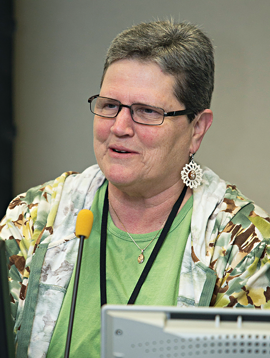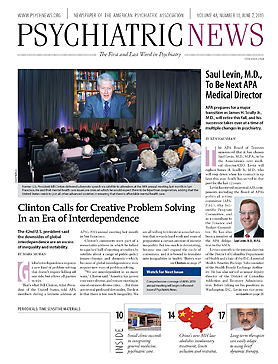For 40 years, the federal government has provided funds to increase the number of minority psychiatrists and mental health professionals through Minority Fellowship Program (MFP). On April 23, key players in the program, as well as some of the program fellows and former fellows, gathered to celebrate the program’s 40th anniversary.
The celebration was held at the Rockville, Md., offices of the Substance Abuse and Mental Health Services Administration (SAMHSA); the agency has administered the program since 1992.
SAMHSA Administrator Pamela Hyde, J.D., kicked off the celebration with a keynote address. Several years ago, she reported, she had visited a MFP meeting, and “there was energy in the room and a lot of promise.” Currently there are 124 program fellows, including psychiatrists, psychologists, nurses, marriage and family therapists, and social workers. The MFP grant for psychiatrists is administered by APA through its Office of Minority and National Affairs (OMNA). Other professional organizations provide grants for their trainees to participate.
President Obama’s Affordable Care Act is going to especially benefit minorities, Hyde explained, since most of the 11 million Americans who will qualify for health insurance starting in January 2014 are minorities. Moreover, once these people have access to health insurance, a large proportion will need mental health care, and that means that there will be a greater need than ever for minority behavioral health professionals, she predicted.
Paolo Del Vecchio, M.S.W., director of the Center for Mental Health Services at SAMHSA, then introduced the six MFP grantee program directors who were present at the celebration, including Annelle Primm, M.D., M.P.H., APA deputy medical director and director of OMNA as well as director of the APA/SAMHSA Minority Fellowship Program. Marilyn King, assistant director of the APA/SAMHSA MFP, was also present.
Heart and Soul of the Fellowship
“Marilyn King is the heart and soul of our program,” Primm declared. “She has created a wonderful, nourishing environment for our fellows. Since APA has been involved with the program, 433 psychiatrists have participated. Jeanne Spurlock, M.D., laid the foundation for the fellowship, in 1974, while she was deputy medical director at APA.”
Primm noted that the ethnicity of the majority of program fellows to date has been African American and Asian American, so APA is “trying to step up recruitment of Hispanic and Native American psychiatrists in training as well.”
Many of the fellows who have graduated from the program have gone on to do impressive things, she pointed out, such as directing community mental health centers or becoming academic faculty; 68 percent work in public-psychiatry settings, she said, and most are providing services in settings where minority populations are the majority of the patients.
Former Fellows Reflect on Benefits
Several former fellows who attended the celebration commented on how the MFP has benefited them.
Pamela Collins, M.D., a psychiatrist and director of the Office for Research on Disparities and Global Mental Health and director of the Office of Rural Mental Health Research at the National Institute of Mental Health, reported that MFP “gave me the opportunity to do some things off the beaten path”—for example, work in international settings. It also helped her learn how APA works, she said.
Aeva Doomes, M.D., a Washington, D.C., child psychiatrist, said that a project she undertook as part of her fellowship “gave me space to grow.” She added that she has also received excellent employment advice from peers in the program. And the close friendships she has developed with some other psychiatrists in the program have been of great benefit, she remarked.
And even though the funds that the MFP offers to fellows are a draw for applicants, the money is “nothing compared to the bonds that you build through the program,” nurse Bridgette Brawner, Ph.D., observed.
“MFP gave me a chance to give back to the street-wise,” if not in Harlem, then at least in Washington, D.C., psychologist Samuel Gordon, Ph.D., attested.
Finally, the former fellows were asked whether they had any suggestions on how the fellowship program might be improved.
It might be a good idea if fellows from the various professions represented in the MFP could come together to discuss a subject of mutual interest—stigma, for example—social worker Llewellyn Cornelius, Ph.D., suggested.
It would be good if people from minority backgrounds could learn about the MFP in their formative years, when they are considering various professions, Brawner ventured.
Perhaps MFP staff could teach fellows how to network, Collins suggested. For instance, “What do you do with all those business cards you have collected?” ■
A video of Annelle Primm, M.D., M.P.H., discussing the APA/SAMSHA Minority Fellowship Program, and of former fellow Aeva Doomes, M.D., telling how she benefited from it is posted at
http://youtu.be/aI49umJsuD0.


